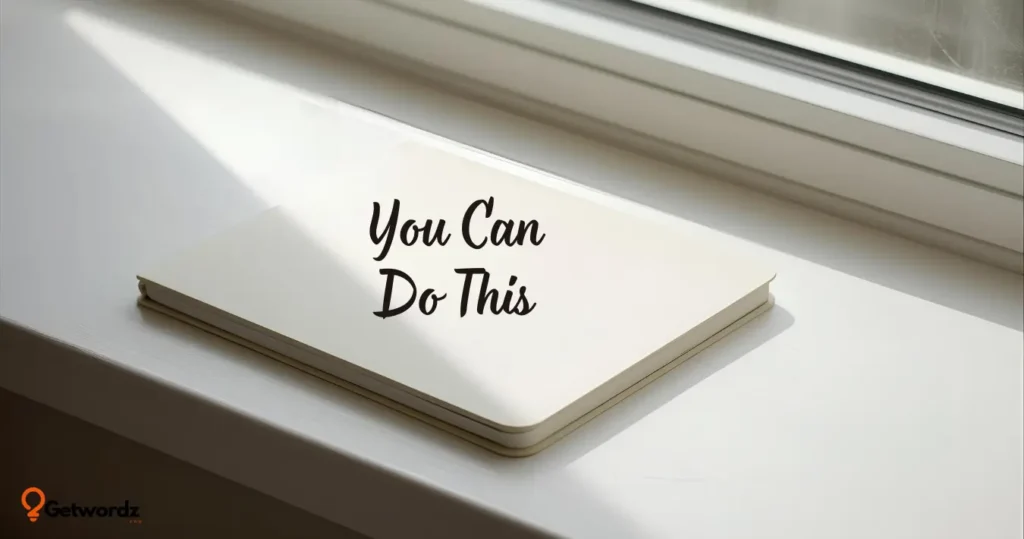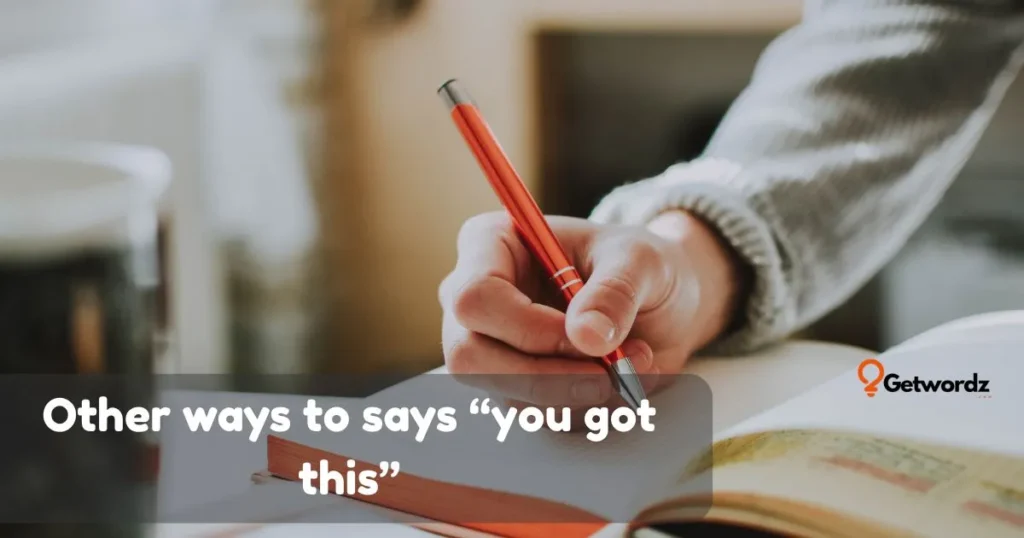“You got this” is one of those powerful little phrases people use to lift someone’s spirits or give a quick boost of confidence. Whether you’re cheering on a friend before a big test, motivating a coworker during a tough project, or supporting a loved one facing a challenge, it’s a simple yet heartfelt way to say, I believe in you.
But because “you got this” is so popular, it can sometimes lose its punch. When everyone says it, it starts to feel a bit repetitive or generic, even when the emotion behind it is real. That’s why many people look for different ways to say “you got this”, fresh, creative, and meaningful alternatives that still sound natural and sincere.
In this post, you’ll find unique expressions, better wording, and funny responses you can use to keep your encouragement original and personal. From everyday pep talks to heartfelt messages for friends, family, colleagues, or partners, these alternatives will help you express support in a way that feels truly genuine.
Ready to discover how to say “you got this” with more warmth, creativity, and impact? Let’s dive into the best alternatives that say it all, without sounding the same.
1. You’ve Totally Got This
Scenario: Your best friend is about to give a big presentation, and they’re full of nerves. You smile and say, “You’ve totally got this,” just to boost their confidence one last time.
Explanation: This phrase is a slightly more enthusiastic version of you got this. It’s casual, warm, and ideal for friendly encouragement when you want your words to sound genuine and upbeat. It’s a creative alternative that still feels authentic.
Examples:
- “You’ve totally got this, I know how much you’ve prepared.”
- “Don’t stress too much, you’ve totally got this!”
- “You’ve done harder things before. You’ve totally got this.”
Why It Works:
It feels fresh yet familiar, balancing reassurance with energy. Adding “totally” gives it a confident and supportive vibe that feels personal and real.
2. You Can Do This

Scenario: A colleague feels overwhelmed before a big project. You lean over and say, “You can do this,” with full belief in their abilities.
Explanation: This is a timeless motivational expression that’s slightly more direct than you got this. It fits both personal and professional settings, making it a versatile phrase and a better way to show confidence.
Examples:
- “Take a deep breath, you can do this.”
- “You’ve trained for weeks, you can do this.”
- “I believe in you, you can do this.”
Why It Works:
It’s simple, strong, and empowering. The directness makes it one of the most effective ways to express trust and belief in someone’s potential.
3. I Believe in You
Scenario: Your sibling doubts their ability to pass an exam. You gently remind them, “I believe in you,” to show trust and emotional support.
Explanation: This phrase focuses on your faith in someone rather than the task. It’s emotional, supportive, and deeply personal, making it a unique expression of care and motivation.
Examples:
- “No matter what happens, I believe in you.”
- “You’ve worked hard for this moment, I believe in you.”
- “Don’t forget, I believe in you more than anyone.”
Why It Works:
It builds an emotional connection and conveys sincerity. It’s more heartfelt than motivational, showing genuine trust rather than simple encouragement.
4. You’re Stronger Than You Think
Scenario: A friend feels emotionally drained after a breakup. You tell them, “You’re stronger than you think,” reminding them of their inner resilience.
Explanation: This comforting phrase focuses on inner strength. It’s motivational yet empathetic, perfect for moments when someone needs emotional rather than practical support. A different way to say you got this that’s filled with heart.
Examples:
- “You’ve been through worse, you’re stronger than you think.”
- “Don’t forget how far you’ve come. You’re stronger than you think.”
- “You’ve got so much strength in you, you’re stronger than you think.”
Why It Works:
It’s compassionate and inspiring. It shifts focus from doubt to self-belief, helping people rediscover their courage.
Read more: Other Ways To Say “Pretty” With Examples!
5. You’ve Got This in the Bag
Scenario: A student is pacing before their final exam. You grin and say, “Relax, you’ve got this in the bag.”
Explanation: This fun and idiomatic expression adds humor to reassurance. It’s informal, lighthearted, and perfect for friends or casual encouragement. It’s a creative way to replace the usual you got this.
Examples:
- “You’ve practiced all week, you’ve got this in the bag.”
- “No competition stands a chance, you’ve got this in the bag!”
- “You know your stuff, you’ve got this in the bag.”
Why It Works:
It’s confident and cheerful. It eases tension while still delivering strong support and belief.
6. You Were Made for This
Scenario: Your partner is about to lead their first team meeting. You look at them and say, “You were made for this.”
Explanation: This phrase highlights natural ability and purpose. It’s motivational, flattering, and ideal for personal or romantic encouragement — a powerful alternative to you got this.
Examples:
- “Step into that room, you were made for this.”
- “You’ve got the skills and the heart. You were made for this.”
- “No one could do it better, you were made for this.”
Why It Works:
It feels powerful and affirming. It reminds people of their talents and strengths, creating confidence from within.
7. Go Crush It
Scenario: Before a sports game, you tell your teammate, “Go crush it,” to pump them up.
Explanation: A bold and energetic way to say you got this, “go crush it” fits perfectly for competitive or performance settings. It’s casual, modern, and great for friends, colleagues, or athletes.
Examples:
- “You’ve trained hard, go crush it today!”
- “Big day ahead? Go crush it like you always do.”
- “Show them what you’ve got, go crush it!”
Why It Works:
It carries energy and excitement, instantly motivating someone to give their best effort.
8. You’re Going to Nail It
Scenario: A coworker is about to give a presentation. You wink and say, “You’re going to nail it.”
Explanation: “Nail it” adds excitement and confidence. It’s an informal, motivational expression that perfectly fits workplace or casual moments when you want to lift someone’s spirit.
Examples:
- “You’ve practiced all week, you’re going to nail it.”
- “Don’t stress, you’re going to nail it like always.”
- “That interview? You’re going to nail it for sure.”
Why It Works:
It’s dynamic and natural. This phrase makes people feel confident without sounding overly serious.
9. You’ve Got What It Takes
Scenario: Your child doubts they can make the team. You say, “You’ve got what it takes,” with full conviction.
Explanation: This phrase emphasizes ability, skill, and confidence. It’s more formal than you got this but still supportive and inspiring, making it a better wording for encouragement.
Examples:
- “Keep pushing, you’ve got what it takes to win.”
- “Don’t let fear stop you. You’ve got what it takes.”
- “Trust yourself, you’ve got what it takes to succeed.”
Why It Works:
It validates hard work and capability. It’s empowering and versatile enough for both personal and professional encouragement.
10. You’re Built for This

Scenario: Before a big challenge, you remind your teammate, “You’re built for this.”
Explanation: This short, motivational alternative highlights resilience and readiness. It’s ideal for people who thrive under pressure and need a confidence boost.
Examples:
- “You’ve trained hard. You’re built for this.”
- “This moment is yours, you’re built for this.”
- “You’ve faced worse. You’re built for this.”
Why It Works:
It’s modern, strong, and empowering. It reminds people that they already have what it takes to succeed.
11. You’ve Got This Covered
Scenario: Your coworker is stressed about managing multiple tasks. You reassure them with a smile, “You’ve got this covered.”
Explanation: This phrase conveys confidence and capability. It’s a professional yet friendly alternative to you got this, suitable for work, school, or team settings. It communicates that the person is organized, competent, and in control.
Examples:
- “You’ve planned everything so well, you’ve got this covered.”
- “No need to worry, you’ve got this covered as always.”
- “Relax, I know you’ve got this covered.”
Why It Works:
It adds a sense of professionalism while still being encouraging. It’s reassuring and respectful, perfect for boosting confidence in a calm and composed way.
12. You’re Ready for This
Scenario: Your friend is about to start their new job, and you send a quick text saying, “You’re ready for this.”
Explanation: This is a grounded and realistic alternative to you got this. It focuses on preparation and readiness rather than hype, making it a thoughtful and supportive phrase for important milestones.
Examples:
- “You’ve worked hard for this moment. You’re ready for this.”
- “All your effort is about to pay off. You’re ready for this.”
- “No doubt. You’re ready for this.”
Why It Works:
It emphasizes preparation and confidence rather than luck. It helps people feel genuinely capable and well-prepared for what’s ahead.
13. You’ll Do Great
Scenario: Before a friend heads into an interview, you tell them, “You’ll do great,” to calm their nerves.
Explanation: A classic, encouraging phrase that’s friendly and easygoing. It’s softer and more conversational than you got this, making it ideal for everyday reassurance.
Examples:
- “Don’t overthink it. You’ll do great.”
- “First day of work? You’ll do great, I know it.”
- “Just be yourself. You’ll do great.”
Why It Works:
It’s warm, natural, and universally comforting. It sounds genuine and kind without being overly intense.
14. You’ve Got This, No Doubt
Scenario: Your friend is nervous before a competition. You grin and say, “You’ve got this, no doubt.”
Explanation: This phrase adds extra certainty and belief to the classic you got this. It’s motivational, positive, and gives an instant confidence boost.
Examples:
- “You’ve trained hard for this moment. You’ve got this, no doubt.”
- “You’re prepared and focused. You’ve got this, no doubt.”
- “I’ve seen your dedication. You’ve got this, no doubt.”
Why It Works:
It’s confident, rhythmic, and full of reassurance. The added “no doubt” removes hesitation, making your support sound absolute.
15. You’ve Got the Power
Scenario: Your sibling feels like giving up on their goals. You encourage them, “You’ve got the power to make this happen.”
Explanation: A motivational and empowering phrase that reminds someone of their inner control and determination. It’s a creative alternative to you got this that feels energetic and personal.
Examples:
- “You’ve got the power to change your story.”
- “Don’t forget, you’ve got the power to make things happen.”
- “You’ve got the power to take the next step.”
Why It Works:
It’s bold and empowering. It shifts focus from luck to personal strength and action, making it ideal for deep encouragement.
16. You’ve Got This, Trust Yourself
Scenario: Someone is second-guessing their choices before an important decision. You tell them gently, “You’ve got this, trust yourself.”
Explanation: This phrase adds a self-assurance element to the traditional you got this. It’s emotional, thoughtful, and perfect for building inner confidence and calm.
Examples:
- “You’ve prepared enough, you’ve got this, trust yourself.”
- “Don’t doubt your instincts. You’ve got this, trust yourself.”
- “Follow your gut, you’ve got this, trust yourself.”
Why It Works:
It combines motivation with mindfulness. It helps people feel capable not just because of others’ beliefs, but their own.
17. You’re Unstoppable
Scenario: A close friend is chasing a big goal. You message them, “Keep going, you’re unstoppable.”
Explanation: This is a high-energy motivational phrase that celebrates someone’s momentum and determination. It’s perfect for athletic, creative, or ambitious contexts.
Examples:
- “You’ve been killing it lately, you’re unstoppable.”
- “Keep moving forward, you’re unstoppable.”
- “Nothing can slow you down. You’re unstoppable.”
Why It Works:
It boosts confidence and momentum. It’s bold, empowering, and helps people recognize their progress and potential.
18. You’ve Got This, Keep Going
Scenario: A teammate is tired during a long project. You say, “You’ve got this, keep going,” to lift their energy.
Explanation: This phrase blends encouragement and persistence. It’s a motivational variation that reminds people not to give up when things get tough.
Examples:
- “You’ve already come this far, you’ve got this, keep going.”
- “Don’t stop now, you’ve got this, keep going.”
- “One more step. You’ve got this, keep going.”
Why It Works:
It’s simple yet powerful. It encourages perseverance and reinforces belief in steady progress.
19. You’re Doing Amazing
Scenario: Your friend is working hard but feeling unseen. You remind them, “You’re doing amazing.”
Explanation: A positive reinforcement phrase that acknowledges effort and boosts confidence. It’s perfect for emotional support and daily encouragement.
Examples:
- “Don’t doubt yourself, you’re doing amazing.”
- “You’re doing amazing, even if you can’t see it right now.”
- “Keep it up, you’re doing amazing.”
Why It Works:
It combines motivation with validation. It helps people feel appreciated, not just encouraged.
20. You’re Going to Smash It
Scenario: Your classmate is nervous before giving a speech. You tell them, “You’re going to smash it.”
Explanation: This British-inspired motivational phrase adds fun and enthusiasm. It’s informal, modern, and fits perfectly in friendly or casual encouragement.
Examples:
- “That presentation? You’re going to smash it.”
- “You’ve been preparing for weeks, you’re going to smash it.”
- “Don’t worry, you’re going to smash it!”
Why It Works:
It’s trendy, confident, and packed with energy. It adds a playful tone while still delivering serious support.
21. You’re Going to Rock This
Scenario: A friend is about to start a new creative project. You cheer them up with, “You’re going to rock this.”
Explanation: This phrase is energetic and uplifting. It’s a fun and expressive way to show faith in someone’s success, great for casual and enthusiastic encouragement.
Examples:
- “That audition? You’re going to rock this.”
- “Big day tomorrow, you’re going to rock this!”
- “You’ve got the skills, you’re going to rock this.”
Why It Works:
It’s confident and modern. It’s perfect for giving someone that extra push of positivity before they step into the spotlight.
22. You’ve Got This, I Promise
Scenario: Your best friend is anxious about a big moment. You look them in the eyes and say, “You’ve got this, I promise.”
Explanation: This reassuring alternative adds personal commitment to your encouragement. It’s warm, emotional, and genuine, ideal for close relationships.
Examples:
- “I’ve seen your effort. You’ve got this, I promise.”
- “Take my word for it, you’ve got this, I promise.”
- “Don’t overthink, you’ve got this, I promise.”
Why It Works:
It deepens trust and reassurance. The added “I promise” makes it sound heartfelt and dependable.
23. You’re Meant to Do This
Scenario: Your partner is questioning their life choices. You gently remind them, “You’re meant to do this.”
Explanation: A spiritual and emotional expression that focuses on purpose and belief. It’s an inspiring alternative phrase to remind someone they’re on the right path.
Examples:
- “You’ve found your calling, you’re meant to do this.”
- “This is your moment, you’re meant to do this.”
- “Don’t doubt it, you’re meant to do this.”
Why It Works:
It connects encouragement to destiny. It provides emotional reassurance that aligns effort with meaning.
24. You’ve Got This, Just Breathe
Scenario: A friend feels nervous before a big speech. You softly tell them, “You’ve got this, just breathe.”
Explanation: This calming phrase blends motivation and mindfulness. It’s great for stressful moments when someone needs both encouragement and emotional grounding.
Examples:
- “You’ve practiced enough, you’ve got this, just breathe.”
- “Stay calm, you’ve got this, just breathe.”
- “One deep breath, you’ve got this, just breathe.”
Why It Works:
It brings calm to pressure. It’s gentle, realistic, and soothing, ideal for anxious situations.
25. You’re Going to Shine
Scenario: Your sibling is performing on stage. You smile and say, “You’re going to shine out there.”
Explanation: This positive and expressive alternative celebrates potential and performance. It’s perfect for moments when someone is stepping into the spotlight.
Examples:
- “You’ve prepared so well, you’re going to shine.”
- “This is your moment, you’re going to shine.”
- “Believe in yourself, you’re going to shine.”
Why It Works:
It’s inspiring and poetic. It encourages confidence while expressing admiration and hope.
26. You’ve Got What It Takes
Scenario: Your friend is doubting their ability to land a new job. You remind them with confidence, “You’ve got what it takes.”
Explanation: This phrase is a classic and powerful alternative to “you got this.” It focuses on inner strength, talent, and determination, making it perfect for professional or personal encouragement. It’s a motivational and authentic expression that feels sincere and supportive.
Examples:
- “You’ve got what it takes to make it happen.”
- “Don’t forget, you’ve got what it takes to succeed.”
- “Keep pushing, you’ve got what it takes.”
Why It Works:
It emphasizes self-belief and capability. It’s timeless, heartfelt, and gives genuine confidence to anyone facing a challenge.
Read More: Other Ways to say “Hit it and Quit it” with Examples!
27. You’re Going to Nail It
Scenario: Your teammate is preparing for an important client meeting. You grin and say, “You’re going to nail it.”
Explanation: A confident and energetic phrase, “you’re going to nail it” is a fun, modern variation of “you got this.” It expresses strong belief in someone’s ability to succeed, making it perfect for both casual and professional settings.
Examples:
- “You’ve practiced enough, you’re going to nail it.”
- “That interview’s yours, you’re going to nail it.”
- “Go in there and show them your best, you’re going to nail it.”
Why It Works:
It’s punchy, optimistic, and full of energy. It motivates people to perform at their best while keeping the tone light and friendly.
28. You’ve Got the Strength for This
Scenario: Your partner is going through a tough emotional phase. You softly tell them, “You’ve got the strength for this.”
Explanation: This emotional and supportive phrase highlights resilience and courage rather than performance. It’s a compassionate alternative to “you got this,” perfect for difficult or sensitive situations.
Examples:
- “You’ve been through worse, you’ve got the strength for this.”
- “Take your time, you’ve got the strength for this.”
- “Even when it’s hard, you’ve got the strength for this.”
Why It Works:
It focuses on emotional support and inner power. It’s empathetic, healing, and deeply reassuring during challenging times.
29. You’re Built for This
Scenario: Your friend is about to face their biggest life test. You tell them with conviction, “You’re built for this.”
Explanation: This strong, motivational expression implies that someone has all the skills, experience, and resilience needed to succeed. It’s a bold and confident variation of “you got this” that works perfectly in athletic, professional, or personal growth contexts.
Examples:
- “You’ve trained hard for this, you’re built for this.”
- “This challenge is nothing for you, you’re built for this.”
- “Keep your focus, you’re built for this.”
Why It Works:
It’s empowering and assertive. It makes the listener feel unstoppable and perfectly equipped for the challenge ahead.
30. You’ve Got This, Believe It
Scenario: Your best friend is scared to take a leap of faith. You look them in the eyes and say, “You’ve got this, believe it.”
Explanation: This is a motivational and emotionally charged alternative to “you got this.” It combines encouragement with mindset, urging the person not only to act but to truly believe in themselves.
Examples:
- “You’ve worked hard for this, you’ve got this, believe it.”
- “You’ve already proven yourself. You’ve got this, believe it.”
- “You’ve got this, believe it with your whole heart.”
Why It Works:
It bridges motivation with belief. It encourages self-trust and determination, turning support into empowerment.
🌟 Pros and Cons of Using the Phrase You Got This
✅ Pros
- 💬 Universally Recognized – Everyone instantly understands it making it an easy go-to phrase for encouragement.
- ⚡ Short and Impactful – Its simplicity makes it powerful and memorable in both speech and writing.
- 💖 Emotionally Supportive – It conveys belief, motivation and reassurance in just a few words.
- 🌍 Versatile for Any Situation – Works equally well for friends coworkers family or partners.
- 🚀 Positive Energy Booster – Encourages confidence and uplifts mood during stressful or uncertain times.
⚠️Cons
- 🔁 Overused Expression – Frequent repetition can make it sound generic or insincere.
- 😐 Lacks Personalization – It doesn’t always reflect a personal connection or context.
- 🏢 Too Casual for Formal Settings – It may sound unprofessional in business or corporate communication.
- 💭 Limited Emotional Depth – Sometimes feels too simple when deeper empathy or understanding is needed.
- 🗣️ Can Sound Clichéd – Its popularity makes it less unique or impactful in writing and speeches.
Closing words
Finding better ways to say you got this helps your words of encouragement feel fresh, real, and heartfelt. This post shared creative alternatives and unique expressions that go beyond the usual phrase, so your messages sound more personal and less repetitive. Whether you’re inspiring a friend, motivating a colleague, or writing a supportive social media caption, these different ways to say it can make a real emotional impact.
Next time you want to lift someone’s spirits, try one of these phrases instead of the same old line. You’ll sound more authentic, thoughtful, and encouraging. Using these creative alternatives shows care, confidence, and originality in your communication.




